Preparations for the
journey
Preparing the trip can be as fun as
the trip itself. This one is no different. Most of the fun is in finding out
what you want to visit at the destination. Actually we wanted to visit St
Petersburg already in 2003, but there we no hotel rooms or flights available for
the period we wanted because of the city's 300th anniversary celebrations.
Internet
Having decided to go for St
Petersburg I started my orientation on the Internet. The following sites proved
to be very useful:
The usenet news group
rec.travel.europe
is also a source of information if you ask the right questions.
Travel Guide book
We 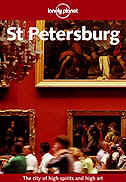 are faithful users of the Rough Guide. We find the advantage of it against
its competitor Lonely Planet, that they are more clearly structured
(more so after the restyling of 2002), but more importantly that they are less budget
oriented. Notably with regard to restaurants and accommodation they have made a broader selection when it comes to price
and comfort. Also Rough Guide has a somewhat more European angle on things and the writers do not impose their views to
the reader as much as LP does. Others may very well appreciate the budget orientation or the more personal style of LP better
.
are faithful users of the Rough Guide. We find the advantage of it against
its competitor Lonely Planet, that they are more clearly structured
(more so after the restyling of 2002), but more importantly that they are less budget
oriented. Notably with regard to restaurants and accommodation they have made a broader selection when it comes to price
and comfort. Also Rough Guide has a somewhat more European angle on things and the writers do not impose their views to
the reader as much as LP does. Others may very well appreciate the budget orientation or the more personal style of LP better
.
Unfortunately the Rough Guide for St Petersburg,
available at the time of our trip was from 2001 and it turned out that
information on e.g. hotels, restaurants, but also museums was outdated. The book
proved to be difficult to get. The new edition was due September 2004 - to late
for us. The most recent edition of Lonely
Planet was a year younger (2002) and widely available, which made us buy a
LP this time 'round.
The Rough
Guides website contains large parts (if not all) of the book contents. Very
helpful while preparing your trip before you have bought the book. The site also contains updates
with information that came up after the publication of the book.
For a map we used the Lonely
Planet Citymap. A handy plastic coated map with detailed city centre maps an
overview map and a underground network map. In addition to that it had maps of
Peterhof and Pushkin, popular excursion destinations.
Back
Accommodation
Accommodation in St Petersburg seems to consist out of
5 categories:
- Soviet stile bunkers, (Oktyarbarskaya, Moskva, Neva, Baltika, etc)
- expensive 4/5 star hotels belonging to western
hotel chains (Sheraton, Astoria, Angleterre, Europe, etc)
- appartements (handy for a longer stay)
- youth hostel (good alternative) and
since recently also
- mini-hotels and b&b.
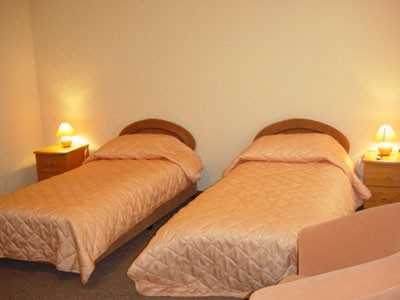 Mini-hotels
are small scale outfits, based in large apartment buildings in the city centre.
One or two floors have been converted into a modern hotel usually offring bed
& breakfast and use of the kitchen. The staff is friendly (as opposed to the
Soviet bunkers) and the service personal. Prices are reasonable compared to the
old Soviet style hotels. We chose Nevsky Inn B&B.
Centrally located, not too expensive ($90 per night). In addition to that they
offer visa support (see under Visa) Mini-hotels
are small scale outfits, based in large apartment buildings in the city centre.
One or two floors have been converted into a modern hotel usually offring bed
& breakfast and use of the kitchen. The staff is friendly (as opposed to the
Soviet bunkers) and the service personal. Prices are reasonable compared to the
old Soviet style hotels. We chose Nevsky Inn B&B.
Centrally located, not too expensive ($90 per night). In addition to that they
offer visa support (see under Visa)
Back
Flight
We wanted to convert our Airmiles. We do that once
every year, but this time it will not work for St Petersburg as there are no
flights available on the days we want it. There are direct flights by KLM and
Pulkovo. KLM
is too expensive for us (± €1200).
Pulkovo has a inconvenient departure time for the return flight: early
morning. Via www.vliegwinkel.nl
and www.schiphol.nl we
sort out the indirect options. Air France and SAS offer the best connections
timewise and pricewise. We choose SAS via Copenhagen. We book directly through SAS
their website. The price is the same (€399 plus €73,71 tax) as with the
internet travel agencies mentioned, but without the reservation charge. 8 days
before departure we receive the tickets and our credit card is
charged.
Back
Personal Guide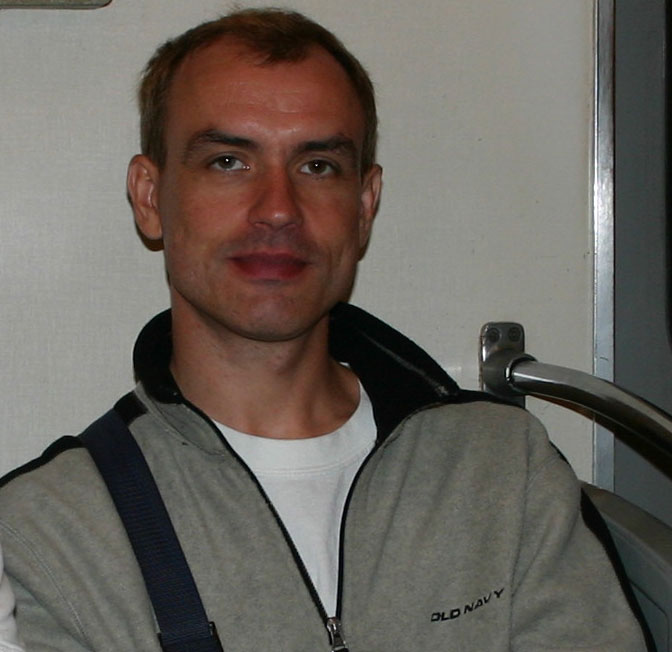
Via Lonely Planet and www.gay.ru
we got the idea of hiring a personal guide for a city walk. Via
www.gay.ru
we find Nikolay.
We make contact via email and agree that he will meet us at the airport and will
guide through the city on two mornings. His tariff is quite reasonable: $10 per
hour, $45 per half day and $35 for the airport transfer. It turns out to be a
good choice. We get to see a lot of the city and he gives us lots of advice
about what to do and not to do.
Back
Visa
Most foreign visitors need visa to enter Russia. I
made myself acquainted with the procedures through the website
of the consulate of the Russian Federation in the Netherlands. The site contains
all relevant information about requesting visa. We need a tourist visa. There
are agencies who take the problem out of your hands like the visumburo
(www.visum.nl) or V&V Visum (
www.visumdienst.nl
), but due to understaffing at the consulate in the summer of 2004 they are
not allowed to process visa requests for individual travellers. They make use of
the consulate in Brussels, but this involves additional costs. At one time this
route is closed off as well and they advise travellers to try their luck at the
consulate themselves. For a visa request you need the following:
- passport (valid 3 months after return from
Russia)
- photo
- visa request form (downloadable)
- invitation and proof of reservation and
payment of hotels (registered with the ministry of foreign affairs). I
get these by fax from the hotel (against payment of $30).
- proof of health insurrance valid in Russia
(travel insurrance with world coverage)
Without these documents a visit to the consulate is
pointless. Every day of your stay has to be covered by invitations. Then starts
the difficult part: handing in the request.The
consulate is open for visa requests Monday, Wednesday and Friday from 10am till
noon. My first visit to the consulate is 11 June. I get there by 8.45 hrs and
find a fairly long queue of about 60 persons. The door opens at 10am and people
are allowed in slowly one by one. There are two lines: one for handing in
requests and one for picking up and paying. In between are lots of Russians
trying to jump the queue. The closer I get to the door, the more hectic it gets.
At noon the consulate closes regardless of the crowd outside. Angry and
disappointed I go home (and dozens with me).
I am not easily dissuaded. On 23 June I make
another attempt. Now 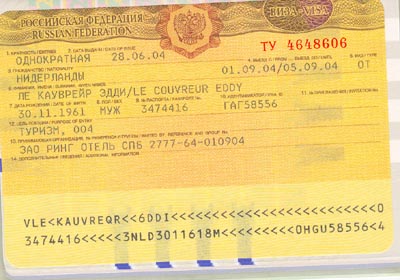 I
am there at 6.45am. Even now I am not the first in line. There are about 10 in
front of me. This time the show starts at 9am. After half an hour I am inside.
At 9.45 I am out on the street again. The visa requests and our passports have
been handed in. I (mindlessly) indicate that I will pick up the visa a week
later. Stupid, because this means €90 instead of €60 per person (because it
is 5 working days instead of 6 or more). I
am there at 6.45am. Even now I am not the first in line. There are about 10 in
front of me. This time the show starts at 9am. After half an hour I am inside.
At 9.45 I am out on the street again. The visa requests and our passports have
been handed in. I (mindlessly) indicate that I will pick up the visa a week
later. Stupid, because this means €90 instead of €60 per person (because it
is 5 working days instead of 6 or more).
Erik goes to pick up the visa. He is there at
6.30am. The door opens for requests at 9am, but the pay desk opens at 10 for
those picking up visa. Erik is first in line. At 10:15 he finally gets in and 15
minutes later he is out again with visa in our passports. There is quite a
chaotic crowd there again and lots of Russians wanting to jump the queue. All in
all it is an expensive affair both moneywise and timewise. The consulate's staff
are very unconcerned and totally insensitive to the wishes of the visitors to
their country. The significance of tourism to the Russian economy is something
they could not care less about. Had we known this beforehand, we might not have
gone through all this trouble.
Back
Water
St Petersburg is situated in front of a swamp and
the city's water pipes are so bad the ground water sips into it mixing with the
drinking water. The ground water is usually infected with parasites like Giardia.
Drinking of tap water is to be avoided at all times!!. Even when brushing your
teeth you should use bottled water and during showering you should keep your
mouth shut. ! Fortunately bottled water is widely available from supermarkets
open 24 hours a day. l
Electricity
Electrical power comes at 230Volts at a frequency
of 50Hz, as anywhere in Europe. The sockets are of the Continental type.
Euro-plugs fit in without any problem. UK, African and Down Under appliances
need an adaptor, while North American and Japanese appliances also need a
converter to 110V.
Language
Russian is a difficult language for non-Slave
foreigners. Few words resemble ours. We never had the ambition to master the
language. But it is handy, in addition to bringing a phrase book, to learn the
Cyrillic alfabet, so that you can recognise signs and street names. Most guide
books and street maps are printed in latin characters. It is also handy when you
travel by metro. It makes it easier to read station names or find signs towards
the entrance (ВХОД),
exit (ВЫХОД) or the
toilet (ТУАЛЕТ).
|
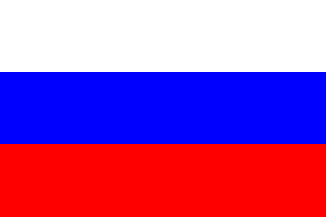
 are faithful users of the Rough Guide. We find the advantage of it against
its competitor Lonely Planet, that they are more clearly structured
(more so after the restyling of 2002), but more importantly that they are less budget
oriented. Notably with regard to restaurants and accommodation they have made a broader selection when it comes to price
and comfort. Also Rough Guide has a somewhat more European angle on things and the writers do not impose their views to
the reader as much as LP does. Others may very well appreciate the budget orientation or the more personal style of LP better
.
are faithful users of the Rough Guide. We find the advantage of it against
its competitor Lonely Planet, that they are more clearly structured
(more so after the restyling of 2002), but more importantly that they are less budget
oriented. Notably with regard to restaurants and accommodation they have made a broader selection when it comes to price
and comfort. Also Rough Guide has a somewhat more European angle on things and the writers do not impose their views to
the reader as much as LP does. Others may very well appreciate the budget orientation or the more personal style of LP better
.

 I
am there at 6.45am. Even now I am not the first in line. There are about 10 in
front of me. This time the show starts at 9am. After half an hour I am inside.
At 9.45 I am out on the street again. The visa requests and our passports have
been handed in. I (mindlessly) indicate that I will pick up the visa a week
later. Stupid, because this means €90 instead of €60 per person (because it
is 5 working days instead of 6 or more).
I
am there at 6.45am. Even now I am not the first in line. There are about 10 in
front of me. This time the show starts at 9am. After half an hour I am inside.
At 9.45 I am out on the street again. The visa requests and our passports have
been handed in. I (mindlessly) indicate that I will pick up the visa a week
later. Stupid, because this means €90 instead of €60 per person (because it
is 5 working days instead of 6 or more).